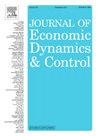Money, inflation tax, and trading behavior: Theory and laboratory experiments
IF 1.9
3区 经济学
Q2 ECONOMICS
引用次数: 0
Abstract
In a Kiyotaki-Wright model, we generate equilibria characterized by the partial or full acceptability of fiat money and by fundamental or speculative trading strategies. In a laboratory setting with real participants, we then test the model's predictions regarding the effects of an inflation tax and the quantity of money on production and welfare. The inflation tax is implemented through the confiscation of money holdings. Consistent with the model's prediction, the inflation tax reduces the frequency at which players trade a low-storage cost good for fiat money. However, contrary to the model's prediction, we did not observe any significant influence of the inflation tax on trading strategies, suggesting that the inflation tax causes only modest production distortion. We also find that the acceptance of money in the lab is not correlated with the proportion of people holding money. We discuss the welfare consequences of the inflation tax and relate them to the experimental findings based on New Monetarist models.
货币、通货膨胀税与交易行为:理论与实验
在清泷-赖特模型中,我们生成的均衡以法定货币的部分或完全可接受性以及基本或投机交易策略为特征。在一个有真实参与者的实验室环境中,我们测试了模型关于通货膨胀税和货币数量对生产和福利的影响的预测。通货膨胀税是通过没收所持有的货币来实施的。与模型的预测一致,通货膨胀税降低了玩家用低存储成本商品换取法定货币的频率。然而,与模型的预测相反,我们没有观察到通货膨胀税对交易策略的任何显著影响,这表明通货膨胀税只引起适度的生产扭曲。我们还发现,在实验室中接受货币与持有货币的人的比例无关。我们讨论了通货膨胀税的福利后果,并将其与基于新货币主义模型的实验结果联系起来。
本文章由计算机程序翻译,如有差异,请以英文原文为准。
求助全文
约1分钟内获得全文
求助全文
来源期刊

Journal of Economic Dynamics & Control
ECONOMICS-
CiteScore
3.10
自引率
10.50%
发文量
199
期刊介绍:
The journal provides an outlet for publication of research concerning all theoretical and empirical aspects of economic dynamics and control as well as the development and use of computational methods in economics and finance. Contributions regarding computational methods may include, but are not restricted to, artificial intelligence, databases, decision support systems, genetic algorithms, modelling languages, neural networks, numerical algorithms for optimization, control and equilibria, parallel computing and qualitative reasoning.
 求助内容:
求助内容: 应助结果提醒方式:
应助结果提醒方式:


